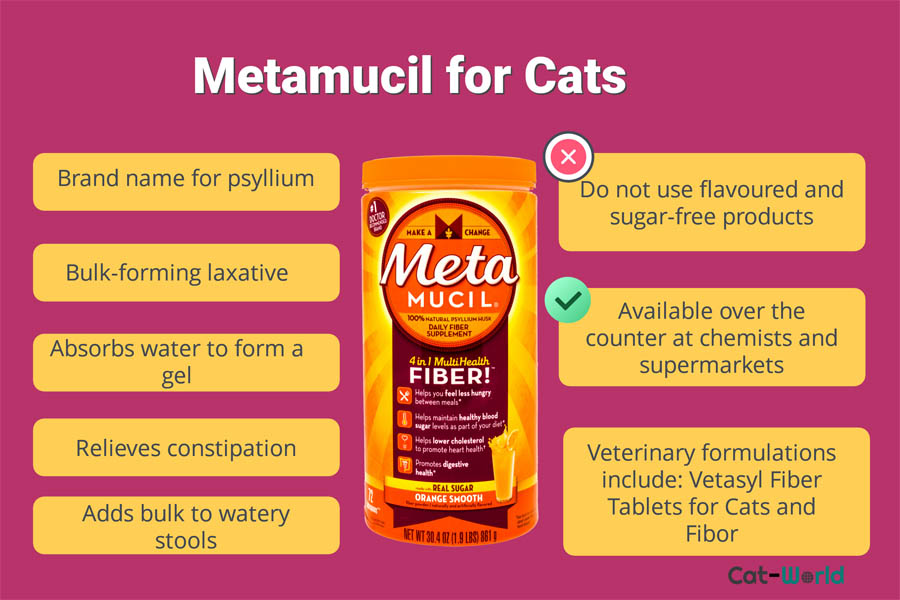Metamucil is a popular brand name for psyllium hydrophilic mucilloid or isabgol, which is a bulk-forming laxative and cholesterol-lowering product for both humans and pets, including cats. It is commonly prescribed by veterinarians to treat constipation and diarrhea in cats and dogs.
What is Metamucil?
Metamucil is made from the hulls of ripe Plantago ovata seeds. It contains both soluble and insoluble fiber. Soluble fiber absorbs water and forms a gel, increasing fecal mass and softening the stool, while insoluble fiber adds bulk to the feces. These properties make Metamucil effective in treating constipation and diarrhea in cats.
Uses of Metamucil for Cats
Constipation
If your cat is constipated due to insufficient fiber intake or if straining to defecate poses a risk, Metamucil can be helpful. The psyllium in Metamucil absorbs water in the large intestine, forming a gel-like substance that adds bulk to the stool. This softens hard, dry feces and stimulates colon contractions, aiding in the passage of feces out of the body.
Diarrhea
Metamucil can also help with watery stools associated with diarrhea and inflammatory bowel disease. It adds bulk to the stool and slows down the passage of feces through the colon, resulting in firmer stools.
Dosage
The recommended dosage for cats is 1-4 teaspoons of unflavored psyllium once or twice per day, added to canned food. It is crucial to ensure your cat is well hydrated while taking Metamucil, as it draws fluid from the gastrointestinal tract. However, it is important to consult a veterinarian before giving Metamucil or any over-the-counter medication to your cat, as there may be underlying causes of constipation that require medical intervention.
How Long Before Metamucil Takes Effect?
Metamucil usually takes effect within 12 to 72 hours.
Where to Buy Metamucil?
Metamucil, also known as psyllium, is available in most supermarkets, pharmacies, and health food stores. It can be purchased under the brand name Metamucil or various generic names. When buying Metamucil for your cat, make sure to choose the original (unflavored) powder.
Side Effects and Contraindications
Metamucil is generally safe for cats to use, but some cats may experience bloating or flatulence when taking it, especially if insufficient liquid is given. It is also important to note that Metamucil should not be given to cats with suspected gastrointestinal blockage or fecal impaction, where prompt intestinal evacuation is required. In rare cases, an allergic or anaphylactic response may occur. If your cat shows any symptoms such as itching or difficulty breathing after administration, seek veterinary attention immediately.
Frequently Asked Questions
How much Metamucil can a cat have?
Start your cat on 1 teaspoon of Metamucil added to canned food. If the symptoms don’t improve, you can add additional Metamucil, but do not exceed 4 teaspoons at a time. If the symptoms persist after two weeks, consult a veterinarian.
Is Metamucil safe for cats long term?
Metamucil should only be given short-term, as long-term use can lead to dehydration.
How do I add more fiber to a cat’s diet?
You can add canned, unsweetened pumpkin or freshly steamed and mashed pumpkin to your cat’s diet. Additionally, there are veterinary formulations available that are high in fiber, such as Hill’s Science Diet Urinary and Hairball Control, Rachael Ray Nutrish Superfood Blends, Natural Balance Original Ultra Indoor Chicken and Salmon Meal, and IAMS Proactive Health Weight and Hairball Control.
How else can I help a constipated cat?
Switching to a wet diet (canned, raw, or dry food moistened with water) and increasing water consumption can help alleviate constipation. Providing clean, fresh drinking water in multiple bowls or using a water fountain may encourage your cat to drink more. Regular playtime with your cat can also help increase gastrointestinal transit time, aiding in the passage of food through the digestive system.
Note: This article is for informational purposes only and does not replace professional veterinary advice. If you have any concerns about your cat’s health or are unsure about using Metamucil, consult a veterinarian.
Sources: Donald C. Plumb – Plumb’s Veterinary Drug Handbook – 9th Edition
